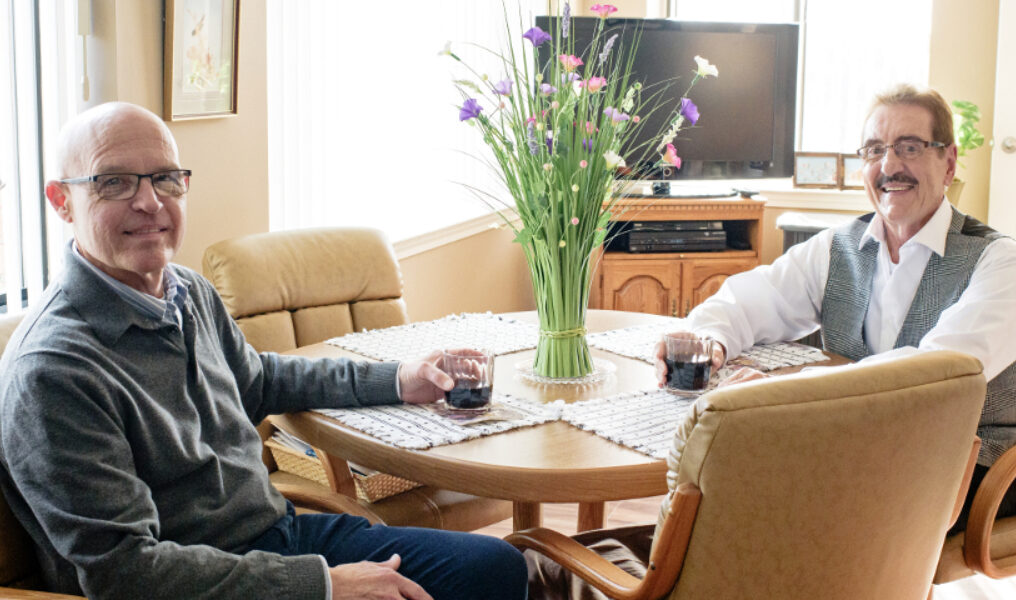Having only lived in their new home for a matter of weeks, Ed Ploegar and Rick Hahn decided to make their way to their community's biweekly movie night for some entertainment and maybe to meet some of their new neighbors. To their pleasant surprise, the film shown was GLAAD Media Award-nominated.
"The movie that they showed last week was the recent release 'Boy Erased,'" Hahn said. "We were quite surprised that in a senior community of this size they would actually choose a gay-themed movie and really, [the movie is about] such a controversial subject [conversion therapy]."
Hahn and Ploegar were surprised a second time after the film was over.
"A number of residents came over and spoke with us and gave us hugs and many of them had tears in their eyes going, 'Oh my gosh, we're so sorry that these things happened and we hope that you didn't experience anything like this when you were young!'" Hahn said. "The people that talked to us after the movie were extremely warm and caring about us as a whole. … That had a good effect on us."
Since moving into the Henry Ford Village senior living community, the couple said that their experience has been nothing but positive, and any concerns they might have had about LGBTQ discrimination have been dispelled. Though the couple wasn't directly looking for a retirement opportunity when they learned of HFV, they said it had been in the back of their minds for years as a potential spot to live when they retired.
"What really piqued our curiosity was when we received one of the fliers a couple of years ago and as we looked at the bottom, we saw it was equal-opportunity housing, pet-friendly, wheelchair accessible and … gay-friendly? 'When did this happen?'" Hahn said. "So that's when we started thinking more seriously about Henry Ford Village. Ed and I are seniors, we're getting up in years and we're both a couple of widowers. We had longtime significant others prior to us getting together and so we wanted to find a place that we would be in a safe environment when the time comes that we're going to be by ourselves. So that was the beginning."
Hahn is 65 and Ploegar is 80. They said that finding a place where they could put down new roots among peers was valuable to them.
"As we age and without any family, we actually do create our own family. And what makes Ed and I feel good about being here is that we've known that the family we will create here as a couple will continue when that time comes that either one of us will pass away," Hahn said. "Indeed, in the nine or 10 weeks that we've been here, we do truly feel a sense of community and now what are going to end up being lifelong friendships."
Aging LGBTQ
Though Hahn and Ploegar's experience should be the standard, it's an unfortunate reality that many LGBTQ elders don't have the luxury of being an out couple without facing discrimination for their orientation. The National Center on Elder Abuse found in a study that of the roughly 9 million of LGBTQ-identifying adults in the U.S., roughly 16 percent of them are elders who face added challenges when searching for post-retirement housing and care.
"LGBT elders face the typical challenges of aging, including the possibility of elder abuse or domestic violence, in combination with the threat of discrimination and abuse due to their sexual orientation or gender identity," the study said. "In a 2006 study by Metlife Mature Market Institute, 27 percent of LGBT Baby Boomers reported that they had great concern about discrimination as they age."
And in a survey of over 400 LGB elders aged 60 and older, 65 percent reported experiencing victimization due "to sexual orientation (e.g. verbal abuse, threat of violence, physical assault, sexual assault, threat of orientation disclosure, discrimination) and 29 percent had been physically attacked. Men were physically attacked nearly three times more often. Those who had been physically attacked reported poorer current mental health."
Part of the reason LGBTQ adults face discrimination of this sort is because of ignorant caregivers. Adam Sterling is the resident life and business development director at HFV. He said that cases of health care provider-related LGBTQ abuse is something he's actively fighting via the organization's existing policies, adding that he's always looking for ways to improve HFV's knowledge base.
"The board adopted a statement of understanding professing its openness and desire to be a warm and welcoming place without discrimination for the LGBT community and that was truly a reflection of the residents and the wills of the residents, as well as the board that is responsible for governance," Sterling said. "Henry Ford is a not-for-profit community so it is the board that ultimately has that responsibility. More profoundly, it's the culture more than anything."
Autonomy in Senior Living
Sterling added that HFV residents are also able to run for spots on the organization's board, which he said allows them to have more autonomy in HFV's decision-making than at other senior living communities.
"I think that talking about resident-led programming is number one, but one further example of that is that we have three residents that sit on the board of directors which help with the governance, which I think really speaks to the level of respect we have for the residents and their independence and empowerment in the community," he said.
Peter Falzon is an HFV board member who is openly gay and whose parents live in the community currently. He agrees with Sterling's assessment of the HFV diversity-oriented culture. When asked if he noticed the organization's commitment to inclusion when he first became aware of HFV, he gave a resounding "yes."
"I actually think Henry Ford Village was already, if you look at the other senior communities in the Metro Detroit Area, way on the forefront of being the most inclusive," he said. "If you walk through there, there is a mix of white people, brown people and black people and you can see they have [inclusive] programs and outreach."
Sterling has worked with HFV for over 20 years. He said that a good signifier of the organization's cultural openness to LGBTQ community members specifically is that even when he began his role in the late '90s he recalls residents both openly and fondly speaking of LGBTQ family.
"I had the first experience of being with the residents of the community in a forum setting and hearing about them talk about a son or daughter and hearing them talk about diversity and having children and grandchildren and relatives who were gay and lesbian," Sterling said. "And then we've had residents who have subsequently moved in over the years as well and I think they've always felt at home and comfortable."
Sterling acknowledged that merely positive mentions of LGBTQ people decades ago doesn't signify that HFV was always fully optimized for inclusion, but that it has laid a good foundation for improved policies. He added that the staff goes through an extensive LGBTQ sensitivity training session to familiarize themselves with the needs of the community members.
"The residents here, even if they aren't LGBT, they have family that are and friends that are and they're very aware. It's not like this was 20 years ago or longer, it's not something they're unfamiliar with or afraid of, they're very aware. And the staff is very aware," Sterling said. "We've had training in the past with Judy Lewis [of SAGE Metro Detroit] and they've really enjoyed that and it's been a great experience and looking for some future training opportunities. SAGE offers a national certification program and we're looking into that right now."
Always Learning
Perhaps the aspect of HFV life that Sterling is most proud of is the freedom the community provides its residents to impact existing programming via the creation of brand-new groups and organizations that suit the specific needs of residents. He noted a travel-specific group that has cropped up in recent years that has resulted in trips around the world for residents. And Falzon said that his mother has been involved with a group that formed recently that is dedicated specifically to creating a dialogue about racism, conscious or unconscious, that can exist in any community.
"It really raises the awareness and I think that's part of the community-building inside of that complex," Falzon said. "I'm really impressed at how thoughtful many of the residents are and how eager they are to engage in social dialogue around issues that are important in today's world. They care."
Sterling said that there isn't a group dedicated to tackling LGBTQ issues currently, but he said he'd be open to residents starting one should they feel the need and exploring more LGBTQ-specific programmatic options in the future.
"We're waiting for Ed and Rick to kick it off," he said with a laugh. "We do have other LGBT residents, but we don't think that at this point anyone has wanted to initiate LGBT-specific programming. But we would be readily, happily able to help them do so. We follow the leadership of the folks that live here and I think to bring substance and make it really valuable to others it would be best if it was initiated by the residents that live here. I think their experience with the movie means that there is a genuine openness and respect for that."
Though Hahn and Ploegar may end up starting a group in their time at HFV, for right now, "we really are just getting our feet went at this point," Hahn said.
"Whenever you change places you are going to be somewhat apprehensive of how things are going to go and actually if you're going to be accepted," Hahn said. "So far, we have truly felt that we have been accepted and welcomed. And Henry Ford Village does have their commitment to diversity right in their mission statement and they say what they mean."
To learn more about Henry Ford Village visit henryfordvillage.com or call 877-660-1807.










